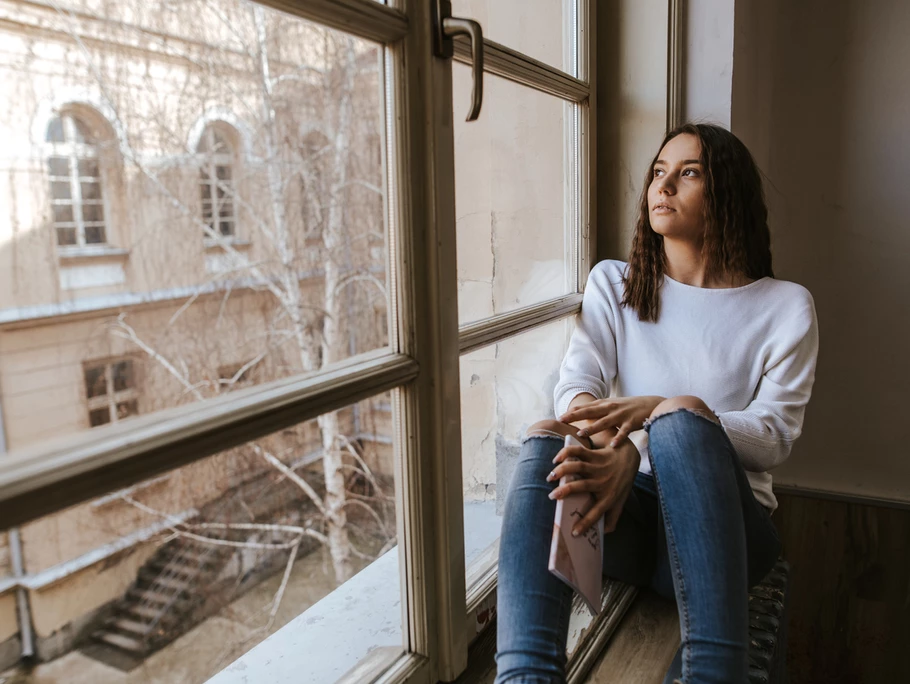Obsessive-Compulsive Disorder (OCD) is an anxiety disorder that occurs when a person gets caught in a cycle of unwanted and intrusive thoughts. These thoughts trigger distressing feelings and cause the person to feel driven to engage in repetitive behavior, compulsions.
Adira’s OCD symptoms began to surface in high school. Read her story to find out how she learned to manage the symptoms throughout college and now is living the life she’s always envisioned.

It was the summer before my senior year of high school and I was on a trip around the East Coast with my family to visit colleges I was interested in attending. To this point I had thrived in high school. I had many great friends, had excelled on the athletic fields, and done well academically so I had my sights on some highly regarded Universities.
We were in New York City on a hot summer day and a random drop of liquid fell on my lip. The sun was shining and the sky was bright blue so I quickly determined it wasn’t a raindrop. Out of nowhere I told myself I had five days to advert any harmful effects this mysterious drop could cause me. If I lived through the five days, I would be okay. For five days I did everything I could while eating and drinking to avoid that one contaminated spot on my lip. I couldn’t track any remnants of the mystery liquid into my mouth, as I was sure it would be fatal.
Five days later I was of course still alive and well. My logical brain told me it was just a drop of condensation falling off of an air conditioning unit. My OCD brain constantly countered with “what if it wasn’t?” What I hoped would be a five day isolated incident of worry wasn’t so temporary. “What if” soon swirled through my head 24 hours a day, seven days a week.
OCD Begins to Manifest
Every day I was bombarded with new anxieties and fears. As I returned to high school for my senior year, OCD overtook me quickly. To my OCD, every chemical in science class was toxic and was to be avoided at all costs. Basketball practice was a nightmare, as the ball bounced on the ground and who knows what kind of dirt and germs were on the gym floor. Receiving hugs from my best friends was all the sudden off limits as I couldn’t be sure they weren’t spreading contamination. I was washing my hands so much that they were bright red, cracked and bleeding constantly.
My family and I realized these behaviors were not usual and I was fortunate enough to quickly seek help from a Behavioral Therapist and started ERP therapy. Though I was clearly not “back to regular Adira,” my situation improved enough that I determined I could seamlessly start college the following fall. I did, however, decide a college on the East Coast was way too far away given my health. I decided to attend a university that was in my hometown and while it is an amazing school, I certainly had doubts about my mental health and figured it would be better to stay close to home.
By the end of my first quarter it was clear I was very sick. My OCD determined so many things were dirty and contaminated. I spent many nights of my freshman year sleeping at home in my parents “clean” house instead of my “dirty” dorm room. I had separated clothing into “clean” off campus clothes, and “dirty” clothes I would only wear when on campus. When I was on campus, I was taking hour-long, scalding hot showers to try and rid myself of the contamination that I felt covered me (by the way, when you share a bathroom with three other girls, they aren’t pleased when it’s occupied for over an hour).
Finding Treatment for OCD
Knowing the situation was getting worse daily, I reduced my course load and entered a daily outpatient OCD program. While this program helped to a certain degree, it was clear I needed more robust help. It was suggested by my treatment team that I attend a residential OCD treatment program. After several years of downplaying the severity of my condition, I finally had reached a point of unhappiness and stress that I knew I couldn’t sustain without more help.
The residential program I attended was an absolute lifesaver. It was hard, hard work, but I finally saw ERP and medication could have some sort of positive effect on my treatment. I did end up having two seperate residential stays there – for a total of 10 weeks. But afterwards I was in a much better position. I was able to return to my University and complete my degree in a field of study I’ve always been passionate about. Post graduation I was in a much healthier place and finally took a leap to move from the Midwest to California, something I had always dreamed of that OCD put on hold.
Though not everyday is easy (in fact I’ve had a severe relapse within the last year), my OCD is generally more manageable than in the past. I’m able to live the life I always envisioned for myself – even if it still includes “what if’s”. I use the tools I’ve learned through treatment to keep the doubts quieter and focus the best I can on fighting the good fight.
OCD Clinical Trial
OCD affects 1 in 100 people. Though there are medications to help treat OCD, many OCD patients, perhaps as many as 40-60%, do not respond to the current medication options. At Biohaven, our mission is to pave the way for new resources and studies so individuals with OCD have more effective treatment options.
We are currently conducting a research study evaluating an investigation medication to potentially treat OCD, with research sites across the country. Learn more about the OCD study and see if you qualify today.